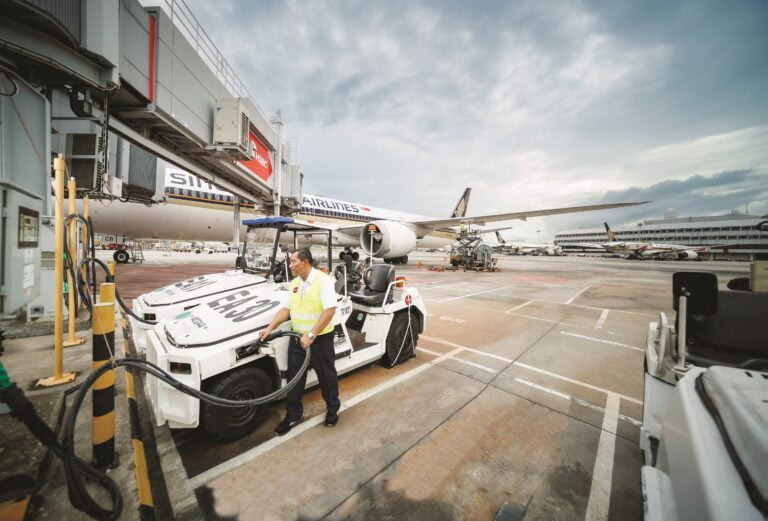Singapore has long been recognised as a pivotal player in the global trade and logistics landscape, a status solidified by the country’s outstanding performance in the recent DHL Global Connectedness Report.
This report measures cross-border flows across four primary categories: trade, foreign direct investment, information, and people flow. For a nation to excel in these areas, it requires a robust physical and digital transportation network, along with a strong aviation and air cargo hub. Singapore, with its strategic policies and advanced infrastructure, stands out as a leader in this domain.
Macro drivers of Singapore’s Trade and Logistics Competitiveness
The macro drivers that underpin Singapore’s success in facilitating global trade and airfreight are Manufacturing and Logistics Competitiveness. Singapore, along with the broader Southeast Asia region, boasts significant potential for growth in manufacturing, trade, and logistics. The region’s strategic location and established industrial base make it a prime area for future development in these sectors. Furthermore, the Progressive Aviation and Trade Policies of Singapore’s government have implemented liberal and favourable aviation policies, with over 130 air service agreements, including 60 open skies agreements. Additionally, the nation has concluded close to 30 free trade agreements, further easing cross-border commerce. These policies are also supported by business-friendly customs regimes and provide cargo owners, logistics players and airlines the flexibility to respond swiftly to market opportunities.
Key differentiators
Changi Airport’s success as an air cargo hub can be attributed to three critical differentiators. Changi Airport’s extensive air network, comprising both passenger and dedicated freighter flights, is crucial. This diverse connectivity ensures that Singapore remains a central node in global air cargo movements. Vibrant Air Cargo Ecosystem, involving airlines, ground handlers, freight forwarders, logistics partners, and government authorities fosters a dynamic community. This collaborative environment ensures the smooth and rapid movement of goods.
Speaking on this occasion, Jaisey Yip, VP of Cargo Business Division at Changi Airport Group said, “Air cargo continues to be a very important transport mode for pharmaceuticals, e-commerce and high-tech. And Changi Airport stays at the forefront of the air cargo industry by enhancing our handling capabilities to meet the unique requirments of special cargo.”
Robust Airport System with operational efficiency and resiliency are vital. Changi Airport’s ground processes are well-oiled to ensure fast cargo movements. Special cargo handling capabilities, especially for pharmaceuticals, e-commerce, and high-tech products, are also prioritised. This includes maintaining stringent standard operating procedures and investing in necessary infrastructure, such as temperature-controlled facilities.
Technological and Operational Innovations
Changi has maintained its status as one of the most innovative and digitally advanced airport groups around the globe. To maintain its edge, Changi Airport has embraced technological and operational innovations, such as Truck Dock Slot Booking application, which was implemented to reduce truck waiting times and improve cargo visibility. This system allows for advance bookings, linking shipments with designated slots for efficient handling.
Addressing this note, Yip explained: “We pulled together like-minded partners and those that really want to pioneer and champion innovation to start this trial for us to do it, the process, both the digital and the ground process. I am glad to share that the trial has achieved good outcomes, and we will be rolling this out industry-wide in Q3.”
Autonomous Ground Operations are a pivotal part of Changi operations and trials of autonomous tractors and dolly tugs are underway, aiming to automate ramp operations and mitigate the impact of inclement weather on cargo handling.
Sustainability and Future Plans
Singapore is committed to sustainable development in its aviation sector, guided by the Singapore Air Hub Sustainability Blueprint. Key initiatives include Sustainable Aviation Fuel (SAF), including partnering with Neste, which has established a SAF refinery in Singapore.
CAG has been collaborating closel with industry and regulatory partners, facilitating trials and engaging stakeholders to encourage the adoption of SAF. Electrification goals include operating an all-electric ground service equipment fleet and installing adequate EV charging stations to reduce carbon footprints. Waste management efforts to boost recyclability rates involve extensive sorting and recycling programmes.
Expanding Capacity with Changi East Industrial Zone
The Changi East Development project, including a new air cargo zone known as the Changi East Industrial Zone, aims to nearly double Changi Airport’s cargo handling capacity from 3 million tonnes to 5.4 million tonnes annually. This expansion, set for completion in the mid-2030s, will integrate advanced, sustainable, and smart infrastructure to ensure seamless cargo flows.
“Cargo needs to flow seamlessly across the air cargo village. It has to be smart. It has to provide enhanced visibility to the different players. And it must be sustainable. So these are the key points that we bear in mind when we are designing the Changi East Industrial Zone,” Yip stated
Conclusions
“I would say that e-commerce definitely is here to stay. If you look at the global average e-commerce penetration rate, I think it’s about 20 percent. According to IATA, about 80 percent of cross-border e-commerce is actually transported by air, which makes up 20 percent of total airfreight that is going around the world. And this will continue to increase. By 2027, one-third of the volumel, transported by air cargo, will be e-commerce. In comprasion, last year, the air cargo demand by the other traditional or conventional sectors are pretty muted,” Yip said.
As Singapore continues to innovate and adapt, its position as a global trade hub is not only maintained but strengthened, ensuring a future of growth and sustainability in the interconnected world of international trade.
Singapore’s strategic policies, robust infrastructure, and commitment to innovation and sustainability cement its position as a global trade and air freight hub. Changi Airport’s ongoing developments and forward-thinking strategies ensure that it will continue to meet the demands of the evolving global market, maintaining its competitive edge in the international arena.




